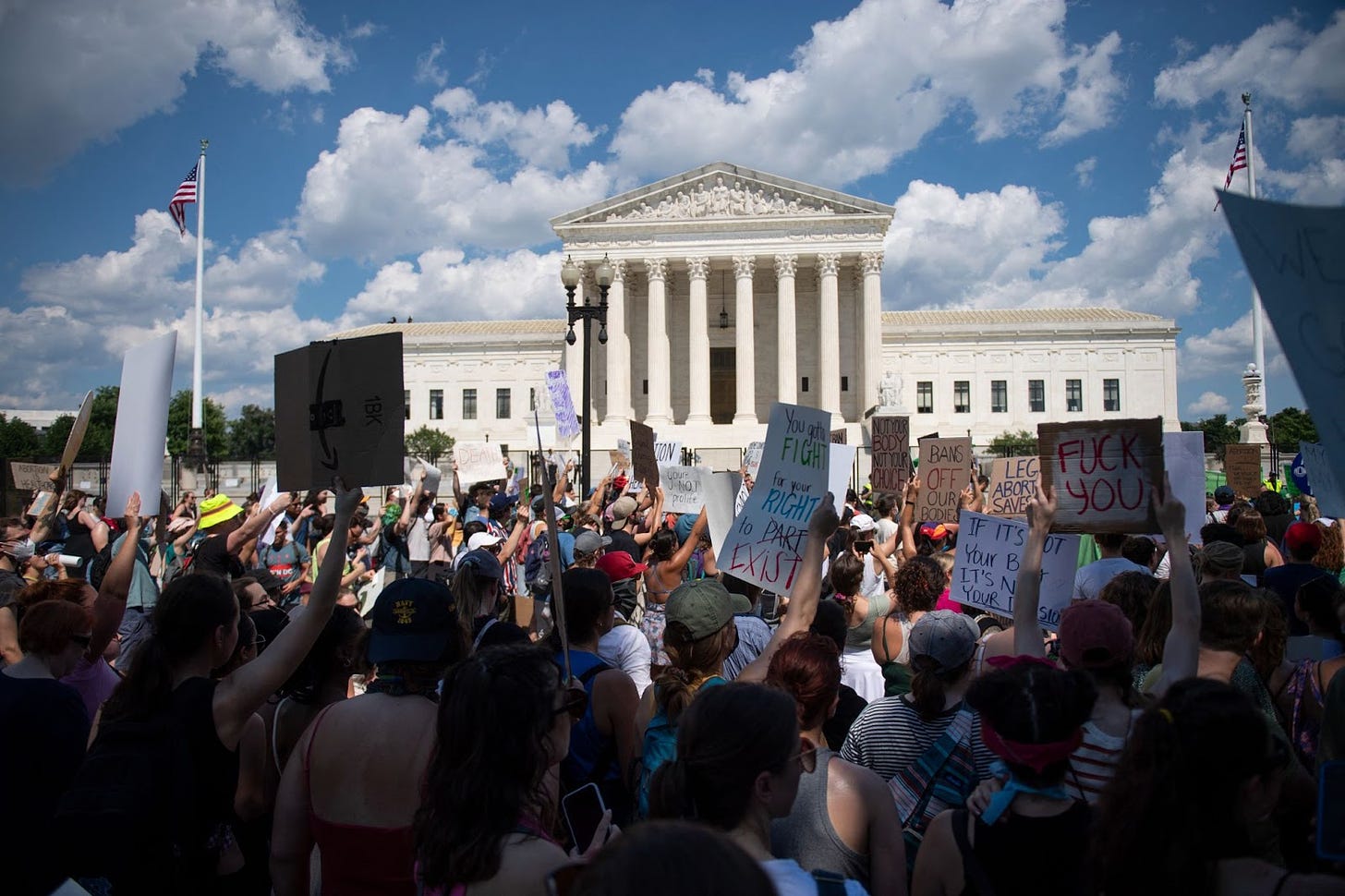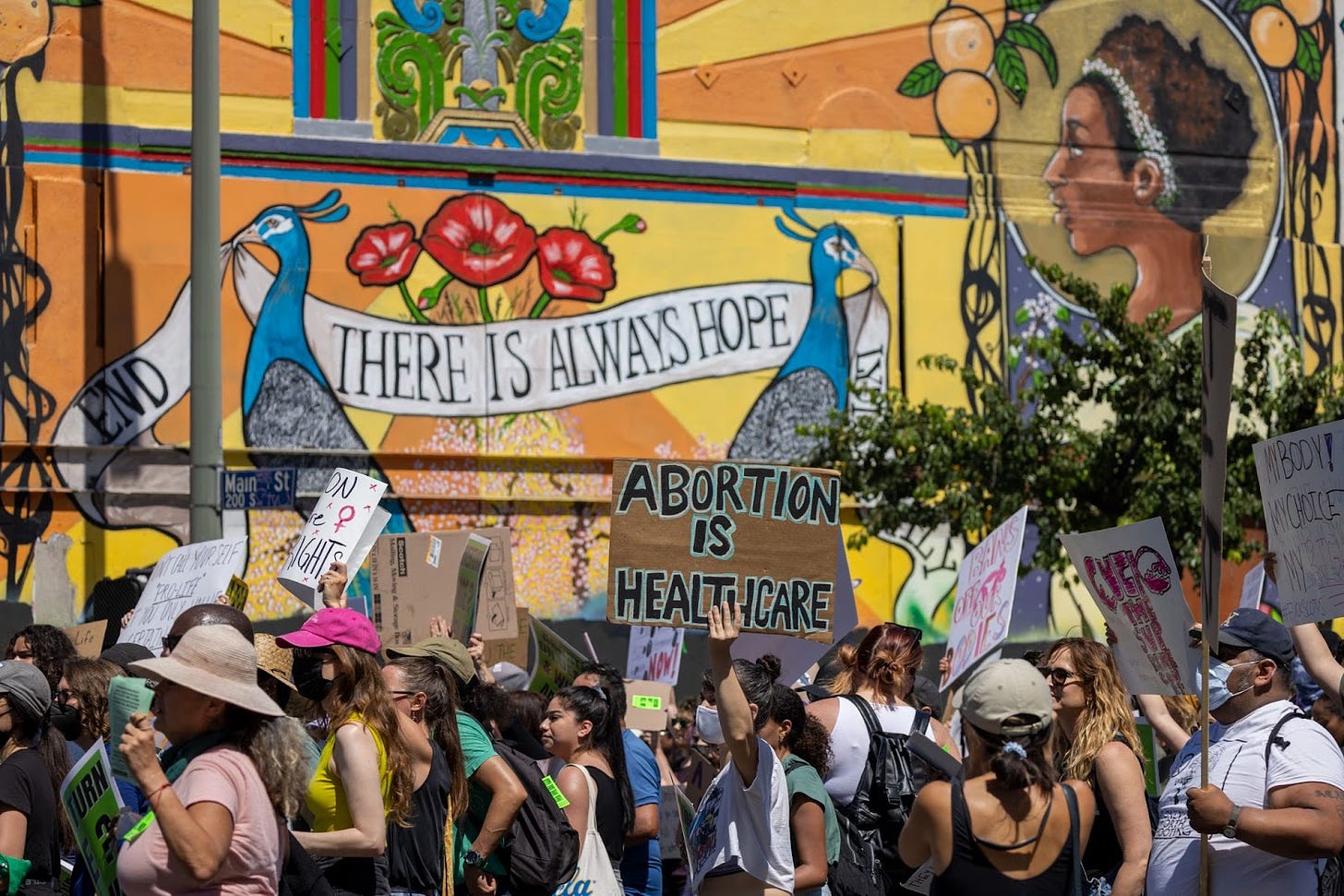Like so many others who didn’t know what else to do, I rushed to Twitter on Friday when news broke that the U.S. Supreme Court had overturned Roe v. Wade.
As I scrolled, I spotted a phrase repeated over and over again: We knew it was coming.
We knew it was coming, and yet … It still hurts. It’s still terrifying. It is still something to grieve.
As Jenna Wortham put it, “Intellectually knowing that something is coming does not prepare you for the devastation in the body when it hits.”
We knew that the Supreme Court’s overturning of Roe v. Wade was coming because a draft of that decision leaked in early May. Not to mention the fact that, for months and years before the leak, plenty of reproductive rights activists warned us this could happen.
On Friday, it was official.
As the news sunk in, it struck me that many of us have been experiencing a version of anticipatory grief since we heard about the leak. We knew it was coming; we just had to wait.
Anticipatory grief is especially difficult because you are doing the hard work of grieving while also knowing that the worst has yet to happen. It’s a challenging place to take action from. And so, most of the work we do is protective: caring for ourselves and others as best we can while also bracing for impact.
At some point, that impact comes. Your loved one dies. Your relationship ends. Your job gets eliminated. You are left with still more grieving to do—but now, there are specific steps to take. You may plan the funeral, decide to get back on the dating scene, or dust off your resume. Or, you might do something even bigger. Many people are motivated to accomplish incredible, amazing things after experiencing a major loss. We do things we only dreamed of before.
We all knew that the Supreme Court’s decision was coming. We had months of preparation—of anticipatory grief, of dread. But none of it lessened the pain we felt when the impact came.
It happened. There is more grieving to be done, yes. But there is also work to do.
Grief is the first step. I’m a staunch believer that, in order to move forward, we need to first allow ourselves to feel whatever hard, painful, and uncomfortable things bubble up right now. There is always a strong temptation to push ahead, to push those feelings aside, but it’s short sighted. Pushing forward without honoring the present only hurts us in the long run.
As Barbara Brown Taylor wrote in Learning to Walk in the Dark, “Sadness does not sink a person; it is the energy a person spends trying to avoid sadness that does that.”
So first, we must give ourselves time to grieve. To feel whatever we need to. Many of us are feeling sadness, anger, frustration, maybe even some despair. We feel nauseous, scared, anxious. At some point, though, we will feel hope. If we allow it, hope will creep in.
And then—with the solidness of grief and the lightness of hope on our side—we can take action.
“The task for those who are stunned by the baldness of the horror, paralyzed by the bleakness of the view, is to figure out how to move forward anyway,” Rebecca Traister wrote in a poignant essay for The Cut. “Because while it is incumbent on us to digest the scope and breadth of the badness, it is equally our responsibility not to despair.”
“Despair is poison,” Traister explained. “It deadens people when the most important thing they can do is proceed with more drive and force and openness than they have before. Which is why the work ahead is insisting on hope, behaving as if there is reason for hope, even if you feel, based on the ample available evidence, that there is not.”
It might seem counterintuitive that, by allowing yourself to feel all the things, you can arrive at a place of hope. But it works. In my darkest moments, hope has always broken through. Hope is what powers me through that darkness, helping me ultimately to land in a lighter place.
No matter how dark today is—and, let’s be honest, things do feel pretty bleak—I believe that hope can carry us to a better tomorrow. And I’m not the only one.
I couldn’t put it better than my friend Rachael did:
I believe in the power of all the people who have been planning for this day since long before you ever told yourself it couldn’t possibly happen. The ones who long ago relinquished the luxury of disbelief. I even believe in the power of all the people who did not. The old anger and the new.
It’s over, but it’s not over yet.
Sometimes, when the anticipatory grief is over, when the deed is done, we feel a sense of relief. And that seems sort of weird, right? It feels wrong to breathe easier once the worst has happened. We beat ourselves up for not responding properly to the circumstances.
But I think that feeling of relief is the first sign of hope creeping in. The end of anticipatory grief means that the thing we were dreading finally happened. After that, we’re left with choices to make. We have a direction to move in. We have the opportunity for action.
Below is a list of places where you can donate, volunteer, and organize. But please remember, first and foremost, to take care of you. Many of us are experiencing heightened emotions and stress right now. If you can, let yourself feel those things—perhaps while also confiding in a friend or trusted ally—before you get out there.
There is work to do today, tomorrow, and many days from now. Join in when you have both grief and hope on your side.
xoxo KHG
The below list of resources is one place to start. If you have resources to add, please share them in the comments.
Also, this goes without saying because the Sweet Dumb Brain community has always been nothing but respectful and loving, but please do not use the comments to debate the legal right to reproductive care. There are other spaces online and in real life where you can do that. This is not one of them.
Mad about Roe? Here’s what you can do. (New York Times gift link)
Donate to ARC Southeast, or check out this evolving list of abortion funds in every U.S. state.
Here’s a thorough list of reproductive justice networks to support.
And a helpful graphic from The 19th*: What abortion looks like in every state—right now







I lost all hope of siring a child when in the fall of 1981 my wife and I were victims of a horrible head on crash caused by a young woman dozing off and drifting into our travel lane.
My wife received multiple injuries to her internal organs, as well as losing a walnut sized portion of her left frontal lob.
The surgeons and our family doctor told me a pregnancy might kill her.
The medical team working on my wife eventually found a rural doctor willing to perform a vasectomy on me.
It is a sadness I sometimes ponder now that I am rapidly approaching my 8th decade. Fortunately I have several step children who love me and soon I may be blessed to welcome into my family another grandchild.
I share this history with you Katie only to explain the vagaries that often can haunt our souls.
You are not to be condemned for giving into the temptation of gorging on the sorrow you and many other women are experiencing following the Supreme Court ruling.
Your personal story leads me to believe you are a survivor.
I had to learn how to be a survivor long ago.
May you and your family be blessed with grace and gratitude for the good things in your life, and the strength do deal with that which is not good in your life.
An old man like me will wait a few weeks, or even months, hoping that the legislators here in Florida will add rape, incest and human trafficking exceptions to our new abortion law.
At age 74, I am horrified at how much social progress is being revoked and how much of it is still in danger. Your newsletter reminds me that there are many young women who are working for equal rights and opportunity. It's so overwhelming, yet you always remind us of the ways we can help.
Thank you so much for including ARC-Southeast in your list. I sent them a donation, along with this comment: My gift is dedicated to all the women before me who fought for their right to speak, vote, have economic freedom, and the right to make their own decisions about their own bodies. While I am grieving this major setback, I have hope that we can, together, pass a constitutional amendment that will finally codify women's rights in the United State of America.
We need to do an end run around this deeply biased and regressive Supreme Court. We need to finally pass the Equal Rights Amendment.